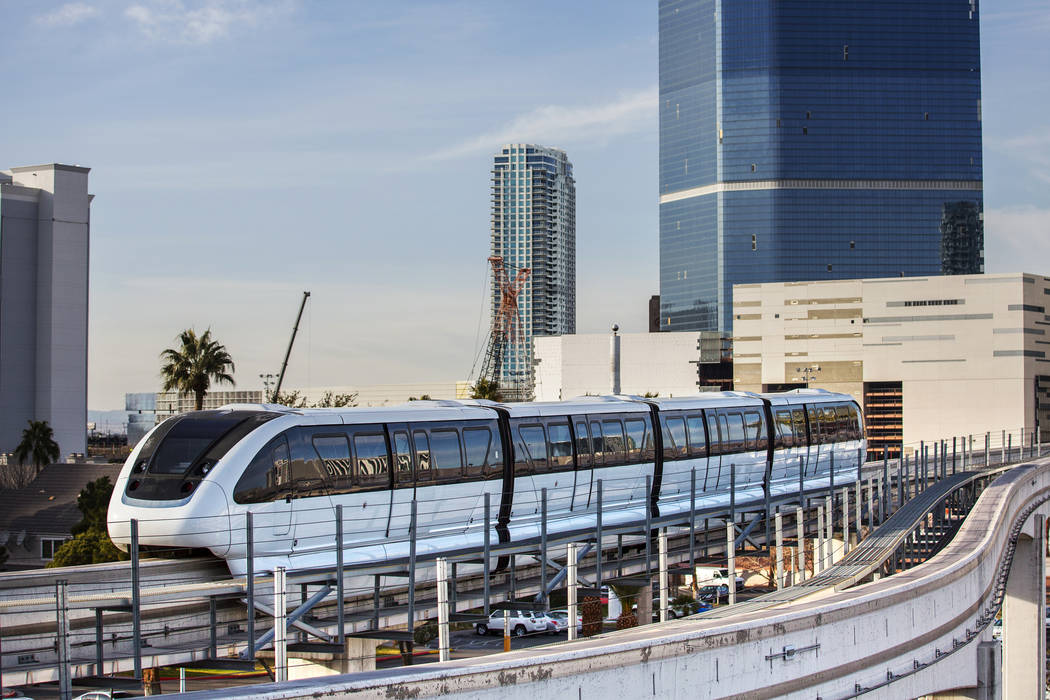Planned Las Vegas Monorail funding update delayed
A scheduled update of the funding related to the Las Vegas Monorail Co. was temporarily derailed this week.
The matter was scheduled to be included on Tuesday’s Clark County Commission meeting, but was pulled from the agenda ahead of the meeting’s start.
Commission chairwoman Marilyn Kirkpatrick said she removed the item because her original request did not include everything she was hoping to get out of the briefing.
“I put it on there to see where we were headed with the monorail and if there was any new information,” Kirkpatrick said. “I just didn’t have time to follow up before the agenda item on questions I had that I wanted them to bring information for, so I pulled it off to give them a better list of questions that I want them to be prepared to answer.”
Among those questions will be where the Monorail stands on trying to borrow $110 million to finance its proposed 2-mile extension from the MGM Grand to the Mandalay Bay, touted as an important aspect to the event-day transportation plan for the Las Vegas stadium.
“That is really one of the reasons why I wanted to get an update from them,” Kirkpatrick said.
Monorail spokeswoman Ingrid Reisman said the Monorail Co. was aware of why the item was pulled and said it will be ready to provide the commission with the latest developments whenever the item is rescheduled.
“We were asked to provide an update to the board and the item was pulled,” Reisman said in an email. “We will provide that update when requested again.”
Las Vegas Monorail Co. President and CEO Curtis Myles stated in March 2018 that the company had figured out where the funding for the extension would come from and said a public announcement was pending. However, that announcement has yet to occur more than one year later.
In documents obtained by the Review-Journal from the Federal Aviation Administration, an email between two FAA officials, dated Dec. 13, 2018, claims Clark County aviation director Rosemary Vassiliadis stated “funding for the Monorail has not occurred.”
Aside from funding issues, the Monorail Co.’s environmental assessment is still ongoing, as the FAA needs additional information from the company before it could be completed, according to Ian Gregor, FAA spokesman.
Additionally, an airport layout plan has yet to be submitted by the Clark County Department of Aviation as the FAA requested. The plan would include various updates to McCarran’s plans, including airfield and runways and any monorail related changes that affect the airport, Gregor said.
The planned extension route runs through portions of McCarran’s property and the Department of Aviation would have to grant right of way use for that to occur.
Aside from the funding and permitting required that has yet to occur, Las Vegas Monorail Co. is still paying back the county a $2.1 million loan taken from interest on a $6 million escrow account funded by the Monorail Co., created for the extension project, which was used for related design and engineering costs.
The monorail has repaid $250,005 of that $2.1 million, making $16,667 payments to the county each month, with the most recent coming this month, according to Erik Pappa, Clark County spokesman.
“We are meeting all of our debt obligations and I don’t have any reason to believe we will not continue to meet them,” Reisman said.
In late 2017, the county also began setting aside annually $4.5 million in room tax revenue that the Monorail Co. can request in case of an emergency. No portion of that money, which is not guaranteed to be awarded, has yet to be requested by the Las Vegas Monorail Co.
Since the Monorail Co. originally set an 18-month construction timeframe for the extension, it wouldn’t be ready for the opening of the Las Vegas stadium if the project started today. The probable first game featuring UNLV football versus the University of California Berkeley, is likely to occur in late August 2020.
Despite the initial plans, Kirkpatrick isn’t ready to count the Las Vegas Monorail out just yet as it relates to being constructed before the first kickoff occurs at the $1.8 billion, 65,000 capacity domed stadium.
“We live in a fast town,” she said. “You’d be surprised with how fast we can build things. Some thought we couldn’t build a stadium in 21/2 years and we’re doing a pretty good job. In today’s world timelines change and that’s why we bring them in to update us where they’re at.”
Contact Mick Akers at makers@reviewjournal.com or 702-387-2920. Follow @mickakers on Twitter.


















